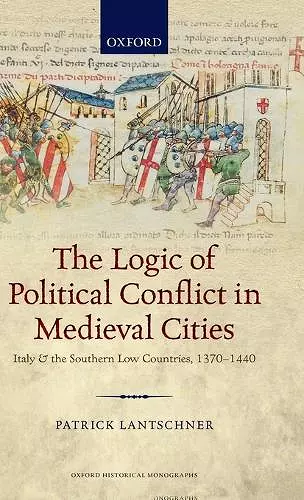The Logic of Political Conflict in Medieval Cities
Italy and the Southern Low Countries, 1370-1440
Format:Hardback
Publisher:Oxford University Press
Published:26th Mar '15
Currently unavailable, and unfortunately no date known when it will be back

This volume traces the logic of urban political conflict in late medieval Europe's most heavily urbanized regions, Italy and the Southern Low Countries. The fourteenth and fifteenth centuries are often associated with the increasing consolidation of states, but at the same time they also saw high levels of political conflict and revolt in cities that themselves were a lasting heritage of this period. In often radically different ways, conflict constituted a crucial part of political life in the six cities studied for this book: Bologna, Florence, and Verona, as well as Liège, Lille, and Tournai. The Logic of Political Conflict in Medieval Cities argues that such conflicts, rather than subverting ordinary political life, were essential features of the political systems that developed in cities. Conflicts were embedded in a polycentric political order characterized by multiple political units and bases of organization, ranging from guilds to external agencies. In this multi-faceted and shifting context, late medieval city dwellers developed particular strategies of legitimating conflict, diverse modes of behaviour, and various forms of association through which conflict could be addressed. At the same time, different configurations of these political units gave rise to specific systems of conflict which varied from city to city. Across all these cities, conflict lay at the basis of a distinct form of political organization-and represents the nodal point around which this political and social history of cities is written.
In this brilliant book, Patrick Lantschner offers new insight into urban revolts in the later Middle Ages ... Lantschner's argument is convincing, not least because of the richness of his book ... We can therefore only hope that Lantschner's analysis will provoke other historians to study the 'earlier' political development of cities in particular and urban history in general from a similar comparative perspective. * Jelle Haemers, Urban History *
this is an excellent monograph and is very well written, providing a detailed overview of complex ideas and situations and in doing so adding an important civic dimension to political studies of state formation ... an impressive book bringing in a range of examples and offering an interesting mix of well-studied cases and less well-known ones ... Lantschner has managed to fit an impressive amount into a short and easy to read survey of six complex situations, and has used them to offer a new political account of the later Middle Ages. * Dr Laura Crombie, Reviews in History *
Lantschner offers his readers a careful, thorough, and insightful analysis ... [a] deeply compelling model of urban conflict, which offers historians a powerful set of tools for understanding political life in medieval cities. * David Foote, The Medieval Review *
Patrick Lantschner's The Logic of Political Conflict in Medieval Cities: Italy and the Southern Low Countries, 1370-1440 is an impressive study of how politics "worked" in the cities of the southern Low Countries and Italy during the late Middle Ages. * Martha Howell, American Historical Review *
remarkable detail based on deep archival research * Tom Scott, English Historical Review *
impressive * Speculum *
- Winner of Winner of the 2016 Bronislaw Geremek Prize for an outstanding first book.
ISBN: 9780198734635
Dimensions: 222mm x 147mm x 23mm
Weight: 472g
290 pages